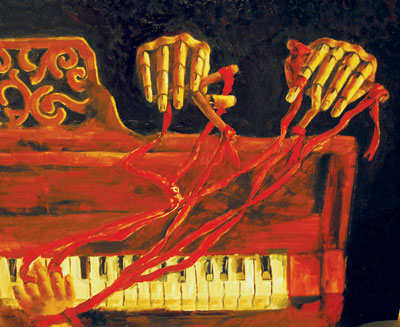All Nonfiction
- Bullying
- Books
- Academic
- Author Interviews
- Celebrity interviews
- College Articles
- College Essays
- Educator of the Year
- Heroes
- Interviews
- Memoir
- Personal Experience
- Sports
- Travel & Culture
All Opinions
- Bullying
- Current Events / Politics
- Discrimination
- Drugs / Alcohol / Smoking
- Entertainment / Celebrities
- Environment
- Love / Relationships
- Movies / Music / TV
- Pop Culture / Trends
- School / College
- Social Issues / Civics
- Spirituality / Religion
- Sports / Hobbies
All Hot Topics
- Bullying
- Community Service
- Environment
- Health
- Letters to the Editor
- Pride & Prejudice
- What Matters
- Back
Summer Guide
- Program Links
- Program Reviews
- Back
College Guide
- College Links
- College Reviews
- College Essays
- College Articles
- Back
Lady Macbeth: the Woman Behind It All
In William Shakespeare’s Macbeth, Lady Macbeth is the mastermind behind her husband’s success. Lady Macbeth’s character has grand ambitions of achieving power and status as queen. However, due to gender inequality, Lady Macbeth cannot pursue her ambitions through the masculine method of carnage; thus, she exploits her husband to kill King Duncan, the man who stands between her and the throne. Lady Macbeth’s powerless position compels her to take control of Macbeth by manipulating and driving him to perpetrate Duncan’s murder.
Feeling unable to commit Duncan’s murder due to gender expectations, Lady Macbeth plays as much of a role in the murder as her femininity allows. In her soliloquy, she implores evil spirits “that tend on mortal thoughts, unsex [her] here”, in hopes to be metaphorically stripped of her femininity (Shakespeare 1.5.43). This request reflects the social construct that women being involved in murder is unthinkable because it is seen as violent and masculine. She goes as far as to lay “their daggers ready”, planning every detail of the crime, yet finding herself incapable of carrying out the gruesome acts (2.2.13). Although she is willing to construct the plan, Lady Macbeth's understanding of femininity inhibits her from executing the deed herself and forces her to coerce Macbeth to take over.
To overcome the social constrictions for women, Lady Macbeth pursues her quest for power vicariously through her husband. In her soliloquy, she pours “[her] spirits in [Macbeth’s] ear.” She is metaphorically intoxicating Macbeth with her lust for power and physically telling him what he must accomplish “with the valor of [her] tongue” (1.5.24-25). To further manipulate her husband, she tells him to "look like the innocent flower, / But be the serpent under't" when King Duncan comes to visit them (1.5.71-72). Lady Macbeth’s advice is not only a metaphor for Macbeth to appear innocent like a flower while hiding his murderous intentions, but also an antithesis by setting up two objects as opposites. Shakespeare utilizes the contrast between an “innocent flower” and a “serpent” to emphasize how Lady Macbeth wants Macbeth to act towards Duncan versus how he should feel towards Duncan on the inside.
To ensure that Macbeth remains submissive to her commands, Lady Macbeth gaslights him through emasculation. When Macbeth hesitates to follow through with Duncan’s murder, Lady Macbeth berates him by calling him a “coward” and saying he is only a man “when [he] durst do it” - belittling his masculinity and provoking him until he complies (1.7.46, 54). Furthermore, Lady Macbeth shames him for having second thoughts by declaring that she would “dash’d the Brains out” of a newborn, “had [she] sworn” to keep that promise (1.7.63). Lady Macbeth uses this hyperbole to imply Macbeth is feeble-minded for thinking of backing out while she would stay loyal to her word. The suggestion that Macbeth is less of a man than his wife eventually leaves him no choice but to kill Duncan as a way to protect his own masculinity.
Lady Macbeth understands she cannot obtain full authority and perceives the limitations of her femininity as an obstacle on her road to power. However, by taking manipulative control over Macbeth, she successfully plays Macbeth as her pawn and drives him to murder the king, indirectly achieving her intent all long. Without her scheming efforts, Macbeth would not have followed through with murder and taken over the kingdom. Ultimately, Lady Macbeth was able to gain power over the process of attaining the throne without compromising her internal perception of femininity.

Similar Articles
JOIN THE DISCUSSION
This article has 0 comments.

Macbeth is one of Shakespeare's most remarkable tragedies. It provokes a series of questions - How far are you willing to go to reach your ambitions? Are you ready to let go of your humanity and eliminate anyone in your path? Do you have what it takes to get there? - all of which pressing and of equal importance to the play. I decided to take a particular focus on the theme of power and control in this play. Yes, Macbeth was the king and the one who slaughtered many innocent lives to remain in power, yet I believe the true genius behind it all was his wife. Lady Macbeth portrays a side of women unseen from other Shakespearean plays. Upon her introduction, she was already more ruthless than Macbeth, plotting the murder of King Duncan before Macbeth even had the guts of saying such ideas out loud. Though due to the gender inequalities of the Elizabethan era, Lady Macbeth was unable to carry out the murders herself; nevertheless, she still contributed to the limitations of her femininity by manipulating Macbeth to carry out her plans.